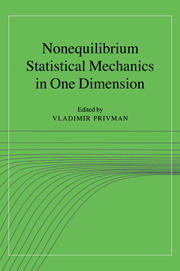Book contents
- Frontmatter
- Contents
- Contributors
- Preface
- Part I Reaction-Diffusion Systems and Models of Catalysis
- Part II Kinetic Ising Models
- Part III Ordering, Coagulation, Phase Separation
- 7 Phase-ordering dynamics in one dimension
- 8 Phase separation, cluster growth, and reaction kinetics in models with synchronous dynamics
- 9 Stochastic models of aggregation with injection
- Part IV Random Adsorption and Relaxation Processes
- Part V Fluctuations in Particle and Surface Systems
- Part VI Diffusion and Transport in One Dimension
- Part VII Experimental Results
- Index
- Abbreviations
9 - Stochastic models of aggregation with injection
Published online by Cambridge University Press: 18 December 2009
- Frontmatter
- Contents
- Contributors
- Preface
- Part I Reaction-Diffusion Systems and Models of Catalysis
- Part II Kinetic Ising Models
- Part III Ordering, Coagulation, Phase Separation
- 7 Phase-ordering dynamics in one dimension
- 8 Phase separation, cluster growth, and reaction kinetics in models with synchronous dynamics
- 9 Stochastic models of aggregation with injection
- Part IV Random Adsorption and Relaxation Processes
- Part V Fluctuations in Particle and Surface Systems
- Part VI Diffusion and Transport in One Dimension
- Part VII Experimental Results
- Index
- Abbreviations
Summary
A generalized aggregation model of charged particles that diffuse and coalesce randomly in discrete space-time is studied, numerically and analytically. A statistically invariant steady state is established when randomly charged particles are uniformly and continuously injected. The exact steadystate size distribution obeys a power law whose exponent depends on the type of injection. The stability of the power-law size distribution is proved. The spatial correlations of the system are analyzed by a powerful new method, the interval distribution of a level set, and a scaling relation is obtained.
Introduction
The study of far-from-equilibrium systems has attracted much attention in the last two decades. Though many macroscopic phenomena in nature, such as turbulence, lightning, earthquakes, fracture, erosion, the formation of clouds, aerosols, and interstellar dusts, are typical far-from-equilibrium problems, no unified view has yet been established. The substantial difficulties in studying such systems are the following. First, far-from-equilibrium systems satisfy neither detailed balance nor, at the macroscopic level, the equipartition principle. Second, the system is usually open to an outside source. A common method to describe such systems is by abstracting the macroscopic essential features of the observed system and constructing a model in macroscopic terms irrespective of the microscopic (molecular) dynamics. In other words, we make a far-from-equilibrium model by assuming appropriate irreversible rules for the macroscopic dynamics.
- Type
- Chapter
- Information
- Nonequilibrium Statistical Mechanics in One Dimension , pp. 181 - 202Publisher: Cambridge University PressPrint publication year: 1997
- 3
- Cited by



